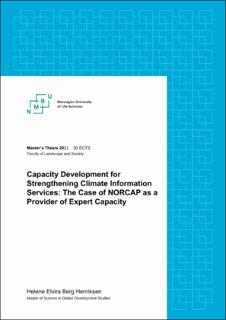| dc.description.abstract | Developing capacities of regional and national entities, as well as local communities, to strengthen the development and delivery of climate information services to foster climate-smart decision-making, is a pressing concern across Sub-Saharan Africa. Since the establishment of the Global Framework for Climate Services in 2009, scholars and actors within the fields of capacity development and climate information services have identified key constraints as well as opportunities for strengthening capacity across the continent, with particular attention to the need for increased support at national level to ensure enhanced resilience in vulnerable nations.
Through a qualitative case study approach, this thesis has applied the case of NORCAP to identify and discuss what NORCAP perceives to be the challenges and opportunities in fulfilling its objective of contributing towards strengthening climate information services in Sub-Saharan Africa through capacity development. To better understand the scope of identified challenges and opportunities of the Norwegian non-profit organisation in meeting its objective, this thesis draws on findings from three key-documents and semi-structured interviews with NORCAP staff and climate experts who served as key-informants. The thesis builds on capacity development literature and scholars of climate services, climate change adaptation and disaster risk reduction to shed light on how international capacity providers can and should provide capacity support to ensure sustainability of capacity development.
My findings suggest that NORCAP identifies several opportunities in its current approach to capacity development for climate information services, particularly at the national level in national meteorological offices. NORCAP upholds an extensive number of technical skills and expertise across varying fields of climate services, which has allowed the organisation to provide capacity support to partnering entities across a range of areas where capacity is lacking. However, targeting support to fragmented and weak institutions limits NORCAP’s ability to ensure a broad scope of support at national level, particularly in Western Africa. My findings also suggest that NORCAP perceives to be challenged by its limited ability to provide funding for the implementation of activities, and heavily relies on the coordination and collaboration with international stakeholders to support its partnering entities in this regard. I conclude that NORCAP has identified and fostered several important opportunities to strengthen climate services since its initial work with climate services begun in 2015. However, NORCAP’s impact mainly lies in its ability to strengthen capacities in regional and national entities, and many hurdles to are to be overcome to have a greater impact at the local level. | en_US |

